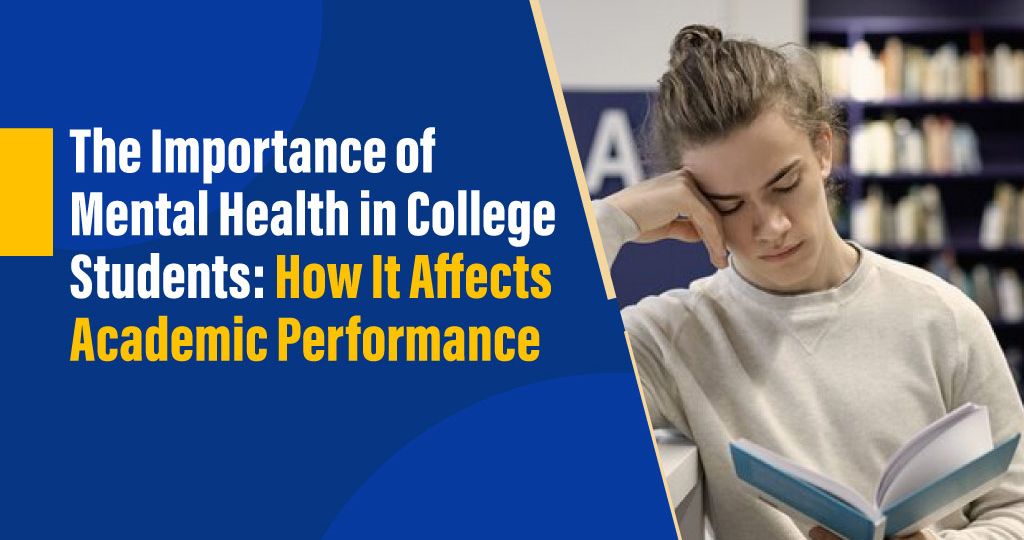
College life is a phase where we are at the prime of our youth. It is definitely one of the most exciting stages in life, with new experiences, limitless potential, and personal growth.
But are the current youth really happy and excited in their college life? Sadly, many students disagree. Though this might be the age where they are at their best physical health, the same logic doesn’t apply to their mental health.
They silently suffer from the enormous pressure laid on them to be the best every time. The pressure to excel academically, to maintain relationships, and to have a clearly laid-out plan about their future, differences within their family, and financial constraints, as well as anxiety triggered by social media, are just a few of the examples.
Mental health issues are as real as physical health issues and not something to be brushed off.
Let’s take a look at why mental health should be everyone’s priority and not another taboo, how it can be detrimental to one’s academic performance, and how to deal with it in the right way.
How Does Your Mental Health Affect Your Studies?
1. Cognitive Function
Anxiety, depression, stress—whatever your mental health issue, all this can have a huge impact on your cognitive performance. The first thing you’ll notice getting hit is your ability to concentrate, memory power, and decision-making skills. This can have a knock-on impact for any student trying to juggle examinations, deadlines, and homework and drastically affect their academics.
2. Attendance & Participation
Students who have issues with their mental health often tend to skip classes or show disinterest and stay away from group activities.
This isolation further worsens the situation as they start falling behind in the class as they have missed a lot of lectures, and as a consequence, their self-esteem goes down.
3. Sleep deprivation and productivity
Sleep is non-negotiable for any human being. Especially for college students, this helps immensely for the well-being of physical and mental health.
But students with mental health issues cause inconsistent sleep patterns. Sleep deprivation has a direct impact on learning ability, problem-solving skills, and even emotional stability. But this is something everyone compromises, unaware of its consequences.
How to know if your mental health issues are affecting your studies?
Being aware is the first step towards healing. And here are a few signs to help you with it.
- Struggling to focus even for 5 minutes
- Not remembering the information you studied during the examination.
- Constant procrastination and failing to meet deadlines.
- Feeling tired always or low energy.
- Losing interest in studies and extracurricular activities that you were once interested in.
- Feeling numb or empty
- Feeling overwhelmed and anxious
- Overindulgence in unhealthy food or stress eating
- Feeling hopeless
How to Put Your Mental Health First as a College Student:
1. Don’t be embarrassed or scared to ask for help
Seeking help when you are going through your mental health issues is not a bad thing. Luckily, many colleges now provide counseling, peer support groups, and wellness initiatives.
Reach out to the ones you trust the most; it can be your friends, professors, and family members.
2. Time Management
If you procrastinate a lot, then here’s what to do:
First, plan your timetable realistically and in a way that is comfortable to your routine.
Divide your task at hand into smaller tasks so that you don’t have to cram everything at the last minute.
There are a lot of apps and planners that can help you balance your academic and personal lives.
3. Exercise and Nutrition
A healthy mind thrives inside a healthy body.
So, regular exercise, decent food, and staying hydrated all the time boost not just your physical health but also your mental resilience.
4. Mindfulness practices
Just stilling your mind for a few minutes every day can work wonders for your mental health and reduce your stress levels.
You can do meditation, deep breathing, and yoga. All these practices are really beneficial to control your mental health issues.
5. Create a routine
A good routine can bring steadiness during times of chaos.
So, set aside a particular time every day for studying, resting, and socializing, but don’t be too packed. Give yourself time to relax also.
6. Limit social media
One of the worst villains of mental health is our tendency to constantly compare ourselves with others and digital overload.
Set social media usage limits and prioritize self-care and in-person contacts.
Why Colleges Should Address Mental Health
Educational institutions have a huge role in creating an environment that values mental health. Colleges can help students handle mental issues in a better manner by providing services like mental health classes, de-stress zones, and accessible counseling.
A mentally healthy student body benefits not only individuals, but also the institution as a whole.
Final Thoughts
Mental health issues are not a taboo anymore, and you can never be truly healthy without a sound mind, especially during your college life.
It is important to balance academics and social life, acknowledging the signs and asking for help. Stop comparing yourself to others on social media and stop chasing unrealistic social standards.
Remember that your mental health is just as important as your grades, if not more.
